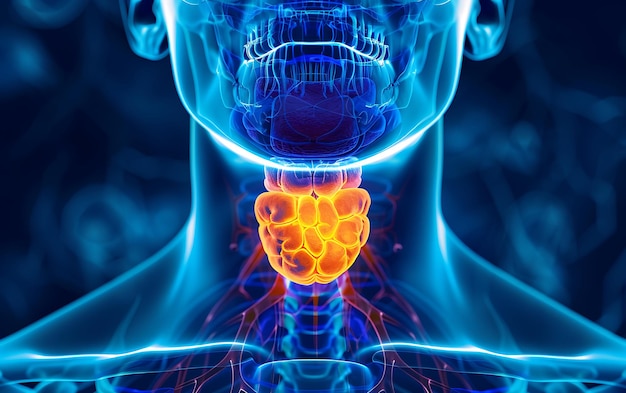A Closer Look at Thyroid Function
The thyroid is a small gland located in your neck, consisting of two lobes connected by a narrow band of tissue called the isthmus. These lobes are made up of many small lobules, which are connected by connective tissue. On a cellular level, the thyroid is composed of follicular cells that secrete the hormones thyroxine (T4) and triiodothyronine (T3).
The thyroid is regulated by the pituitary gland, which acts like a hormonal thermostat. When it detects low hormone levels, it releases thyroid-stimulating hormone (TSH), which stimulates the thyroid to produce T3 and T4.
T4, T3, and Calcitonin
Thyroid hormones T4 and T3 are crucial for controlling your body’s metabolism. They signal your cells to convert oxygen and calories into energy. Every cell in your body relies on these hormones. The thyroid produces them continuously but releases more when your body needs extra energy. For example, if you’re feeling cold, your thyroid will release extra hormones to help keep you warm. During pregnancy, the thyroid increases hormone production to meet the energy demands.
Your thyroid uses iodine to produce T4, which makes up about 80% of the thyroid hormone in your body. T3, although less common, is much more potent and is refined from T4 in the thyroid, liver, and pituitary gland.
The thyroid also produces a hormone called calcitonin, which is involved in calcium and bone metabolism in some animals. However, its exact role in humans is not fully understood, and it is generally not considered a thyroid hormone like T4 and T3.
Thyroid and Endocrine System
The endocrine system is a network of glands that secrete hormones directly into your bloodstream, acting as a messaging system within the body. It regulates processes like growth, development, and reproduction. The endocrine system communicates with the rest of the body through hormones, which are chemical messengers. Although there are many types of hormones in your blood at any given time, each type only communicates specific information to specific types of cells.
Endocrine Disruptors
The endocrine system can be disrupted when the chemical signals get lost or corrupted, often due to malnutrition or chemical interference. Endocrine disruptors are chemicals that interfere with the hormonal signals of your endocrine system, causing various developmental, reproductive, neurological, and immune disorders. They can block, mimic, or alter the production of your natural hormones, leading to significant health issues.
Endocrine disruptors can cause a range of health problems, including birth defects, reproductive issues, cancer, and nervous and immune system disorders. This is particularly concerning for fetuses and infants, whose organs and neural systems are still developing. Common endocrine disruptors include dioxins, PCBs, and pesticides, which are found in many everyday products like plastic bottles, food containers, household chemicals, and cosmetics. Prevention is key, so removing known endocrine disruptors and toxins from your environment is crucial.
Inadequate nutrition can also lead to severe thyroid issues. Your endocrine glands need specific nutrients, like iodine, to produce hormones.
Common Thyroid Disorders and Symptoms
Here are some common thyroid disorders and their symptoms:
Hypothyroidism
Hypothyroidism is an underactive thyroid that doesn’t produce enough thyroid hormone. Symptoms include joint and muscle pain, sensitivity to cold, weight gain, fatigue, constipation, brittle hair and nails, heavy or irregular menstrual cycles, depression, hair loss, slow heart rate, puffy face, hands, and feet, and hoarseness. Hypothyroidism is particularly harmful to developing children, infants, and fetuses, leading to permanent physical and mental underdevelopment. Expectant mothers should ensure they get proper thyroid nutrition.
Hyperthyroidism
Hyperthyroidism is an overactive thyroid gland that produces too much thyroid hormone. Causes include Graves’ disease, toxic adenomas, and subacute thyroiditis. Symptoms include difficulty concentrating, weight loss, increased appetite, goiter, frequent bowel movements, tremors, sweating, hair loss, irregular menstrual cycles, high blood pressure, heart palpitations, restlessness, insomnia, nervousness, and protruding, itchy eyes.
Graves’ Disease
Graves’ disease is an autoimmune disorder and the most common cause of hyperthyroidism. It causes the immune system to mistakenly attack the thyroid gland, leading to overproduction of thyroid hormone. Graves’ disease can affect anyone but is most common in females over 20.
Thyroiditis
Thyroiditis is inflammation of the thyroid, caused by viral infections, trauma, immune disorders, or drug reactions. Pain may or may not be a symptom. Hashimoto’s disease is a type of thyroiditis where the immune system targets and destroys the thyroid gland, leading to inflammation and hyperthyroidism. Subacute thyroiditis is a painful, swollen thyroid often caused by a viral infection, common in middle-aged females who recently had an upper respiratory infection.
Goiter
A goiter is an enlarged thyroid gland, often causing visible neck swelling. The most common cause worldwide is iodine deficiency. When the thyroid lacks iodine, it grows larger to capture more iodine.
Thyroid Nodules
Thyroid nodules are small lumps in the thyroid gland. Most are benign and harmless.
Thyroid Cancer
Thyroid cancer is the eighth most common cancer in the United States and the most common cancer of the endocrine system. Most types grow slowly and can be successfully treated if detected early. The survival rate is generally good. Treatment usually involves surgery, hormone treatments, and radiation therapy. Thyroid cancer affects women more than men, with risk peaking in their 40s and 50s for women and 60s and 70s for men. Family history and radiation treatments to the head or neck during childhood increase the risk.
Types of Thyroid Tests
Diagnosing thyroid disorders can be challenging due to similar symptoms across different conditions. Healthcare providers can perform various tests to identify thyroid disorders. If you suspect a thyroid issue, schedule a test with your healthcare provider. Tests typically involve blood analysis to measure hormone and antibody levels. Your healthcare provider should consider your full medical history before making a diagnosis.
TSH Test
This test measures thyroid-stimulating hormone (TSH) levels in your blood. It’s the most reliable test for hypothyroidism and hyperthyroidism. High TSH levels indicate the pituitary gland is working overtime to stimulate the thyroid, suggesting hypothyroidism. Low TSH levels indicate hyperthyroidism.
T4 Test
A T4 test measures the amount of thyroid hormone in your blood. High T4 levels indicate an overactive thyroid, while low levels indicate an underactive thyroid. Certain conditions and medications can skew results, so your healthcare provider should consider these factors.
T3 Test
A T3 test measures the levels of triiodothyronine in your blood. It’s important to check both T4 and T3 levels, as some cases of hyperthyroidism may show normal T4 but high T3 levels. The T3 test is not useful for diagnosing hypothyroidism.
TSI Test
The TSI test measures thyroid-stimulating immunoglobulin, an antibody present in Graves’ disease. It’s usually ordered when Graves’ disease is suspected, especially during pregnancy.
Antithyroid Antibody Test
This test checks for antibodies that target the thyroid. A positive result could indicate Hashimoto’s disease.
Can You Live Without Your Thyroid?
Thyroidectomy, the partial or total removal of the thyroid gland, is used to treat severe thyroid disorders like goiter, severe hyperthyroidism, and thyroid cancer. Survival rates after thyroidectomy are good. However, after a total thyroidectomy, you will likely need to take hormone replacements daily for the rest of your life. If only part of the gland is removed, you may still be at a higher risk of hypothyroidism. Ensuring adequate nutrient intake is crucial after any thyroid surgery.
Thyroid Diet Considerations
A well-nourished thyroid is essential for proper function. A carefully planned diet with thyroid-supporting foods is crucial for maintaining thyroid health. If your diet lacks the necessary nutrients, consider supplementation with essential nutrients like iodine and selenium.
Vegetarians and vegans need to be particularly careful, as many thyroid-supporting nutrients are found in animal sources. However, a well-planned vegan diet can still support a healthy thyroid. It just requires extra thought and research.



